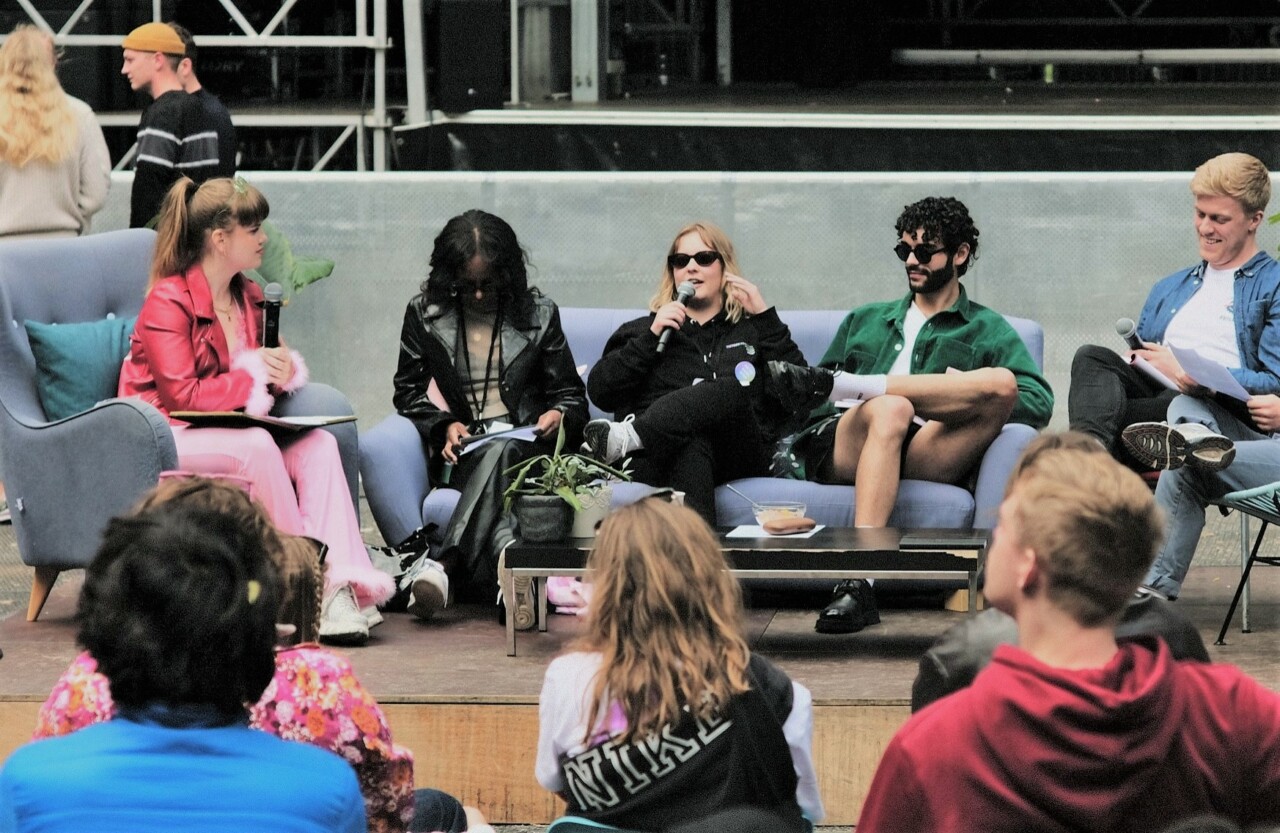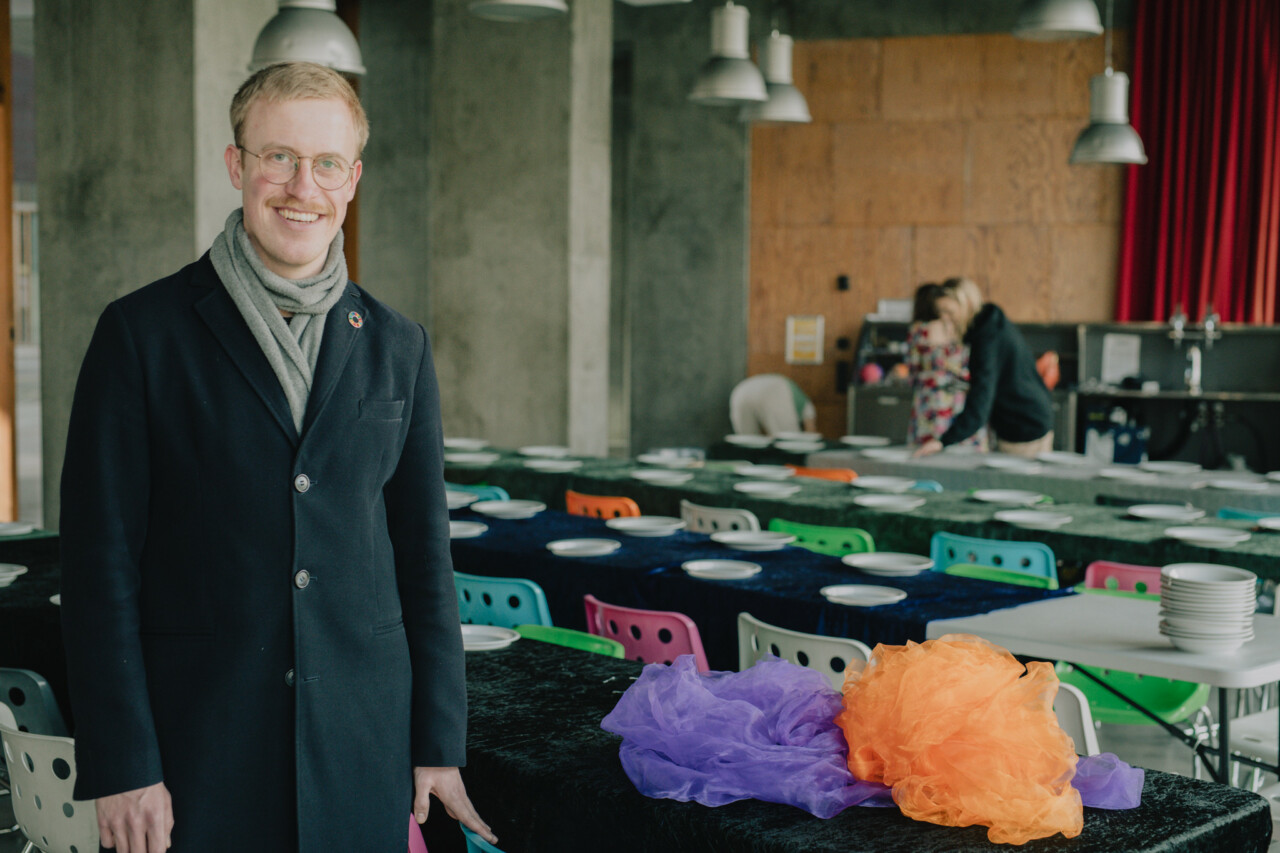Universitetsavisen
Nørregade 10
1165 København K
Tlf: 35 32 28 98 (mon-thurs)
E-mail: uni-avis@adm.ku.dk
—
Student life
Dorms Disclosed — Tietgenkollegiet was made to be the best possible setting for the best possible dorm. It is, almost, say residents. But only almost.
Only one in ten applicants are offered a place at the Tietgenkollegiet.
TIETGENKOLLEGIET
Rued Langgaards Vej 10-18, 2300 København S
Monthly rent: DKK 4,000 – 7,000 for rooms of 26-45 m2.
Average age: 22-23
Application process: Open for applications four times a year. Your Danish grade point average needs to be higher than seven. And you need to study at a full higher education programme.
Maria Aarup, who is a student of anthropology and is one of the dorm’s approximately 390 residents, understands the popularity of it. So far, she has been an active member of the dorm’s resident council, the Tietgen Festival and the soccer team. And as she has become more and more involved, she now believes that she lives at the best dorm in Copenhagen.
SEE THE FULL ‘DORMS DISCLOSED’ UNIVERSITY POST SERIES: Reviews by student residents of dorms and residence halls in Copenhagen
»To be this active takes up a lot of time. But it has also been super exciting. It is like a ripple effect when you get involved, and people start to know who you in a positive way. I’m so pleased that this is where I’ve ended up.«
On top of a wide range of committees, the dorm is the setting for two music rooms, several communal terraces, three indoor bike rooms, a gym, a reading room, a sewing room, and a workshop.
Last year, the dormitory’s nomination committee got 1,000 applications, and after four rounds of applications, 111 students were able to move into the circular building.
READ ALSO: The University Post’s first review of Tietgen here.
Peter Hybschmann, who is a student of global development and who has lived at the Tietgen dorm for three and a half years, was rejected in his first two applications. He only made it in officially on his third application, and only after he had been an active member of the technical committee, the committee for exchange students, and had organised the bike workshop for one semester while sub-leasing a room at the residence hall.
»I’m really bad at writing applications and selling myself. And this is a bit paradoxical considering how much I’ve been involved in the dorm subsequently.«
Peter Hybschmann later became chairman of the dorm council, which consists of 30 residents and that meets once a month to discuss life at the dorm.
Maria Aarup was also rejected on her first application before getting in on her second. Some residents have to apply six times before they succeed.
The application process and the criteria for admission are also something that is regularly discussed between the residents and the owners of the residence hall, the Tietgen Kollegiet foundation.
According to Maria Aarup, who has been on the board of the dorm council for two years, a majority of the residents would like to see more diversity at the dormitory.
»Residents want to open up the residence hall and to remove certain requirements during the selection process. But it is the foundation and the owners that are setting limitations. I think that we are becoming more and more homogenous at Tietgen, and I think that’s a pity. Because I really learn a lot from living with people who study something different than me.«
Peter Hybschmann agrees:
»I think you can criticize the fact that there is a grade requirement of seven from upper secondary school, and that this perhaps will affect people unevenly, socially or financially. It’s a bit like applying to the university, and having your visual arts grade or your sports grade having an influence.«
READ ALSO: When the University Post’s returned to Tietgen for the second time.
It is not the residents but the board of the foundation who have the final say, however. And even though the residents’ board also think that there should be space for everyone, Maria can see that it is not easy to change the process:
»What are the criteria, then? And how many quotas should there be? Right now there is, of course, a gender quota, because you want an even number of men and women. But from there, and then to, say, speak about alternative genders, shorter study programmes, and so on, there is some way to go.«
Both Maria and Peter have one piece of advice to people who would like to live at the Tietgen residence hall. Keep applying!
In the years subsequent to the dorm’s construction in 2006, it received a series of international architectural awards. And you can understand this when you stand in the middle of the circle and look up at the kitchens, hanging eight metres out of the building.
»This setting blew me over the first day I was here,« says Peter Hybschmann with enthusiasm in his voice.
FACTS
The building was designed by the architects Lundgaard and Tranberg, who are also behind other Copenhagen landmarks like the Skuespilhuset theatre, Axel Towers, the rebuilding of the Natural History Museum of Denmark and several other residence halls.
There are 360 rooms with own bathroom and toilet, and 30 of them are for couples. 60 rooms are reserved for international students.
The committees include the exchange Committee, the music committee, the baking Committee, the LGBT committee, the party committee, the café committee and the nomination committee.
He fell in love with the dorm on a study tour at upper secondary school. »It is a big building, but it is still possible to feel that it is invites you to become a part of the community and social life. I thought: This is where I want to live!«
All common rooms face the circle, while private rooms face the outside world. This means that residents feel they are a part of a larger place.
»But it also make it super easy to stalk each other,« says Maria Aarup laughing.
Maria Aarup and Peter Hybschmann think of that dramatic evening at the end of January, when the Danish handball men’s team won the World Championships.
»We all opened the windows and shouted and applauded with each other. People started playing Danish rock band Volbeat over the speakers. And what ever you think about this, it was great that we had all this energy breaking out,« says Peter Hybschmann.
»It’s the same in the summer on the terraces when you sit and can shout at each other. I have a brother that I yell at every now and then when he goes down in the circle. He lives on the opposite side.«
What do you yell at each other?
»I try to startle him. Or I shout that he has to remember to call home.«
Both the dorm residents appreciate that the architecture provides a setting for both small and large communities across the residence hall. But award-winning architecture does not automatically make a residence hall the best, according to Peter Hybschmann.
»There are no traditions from the outset. This is something that needs to be created and shaped. And the volunteer life at the dorm suffered a blow during the corona crisis, when many traditions and committees went into hibernation. But I think we have the facilities to be the best dorm. And the festival, the soccer teams and the Tour de Tietgen have survived corona to a large extent.«
World championships and balcony life are not the only things that the residence hall has.
One of the biggest events of the year is the Tietgen Festival.
»Our festival is a great event,« says Maria Aarup. »We move from really not using the space in the middle of the circle to it it suddenly becoming a stage with 2,000 people in it as audience. It’s something special to be able to stand in the middle and look up at both the starry sky and the light show from the windows.«
»It’s crazy that we as a community manage to get this big event up and running, when everyone pitches in.« The festival is now going to take place for the sixth year running, and it is, according to Peter Hybschmann, the largest student residence hall festival in the Nordic region.
Another big tradition is the Tour de Tietgen, a large-scale party tour of the 30 kitchens in the dormitory. »We start at 9 am in the morning with a light breakfast and a shot of Jägermeister with the employees of the administration. And then you tour the kitchens, one theme at a time. The first games are usually more detailed, because you can do a bit more than towards the end when people are, frankly, drunk legless,« says Peter Hybschmann.
Maria Aarup remembers the Tour de Tietgen of 2021, when one kitchen had a Narnia theme.
»It was so good: First, you went through the wardrobe, where a lot of jackets hung down from the ceiling. Then they had made the walls white and drawn up fir trees. Finally, you came into their kitchen, where we were to watch the Aslan ceremony, complete with voiceover. They acted out the scene where Aslan is killed, and afterwards there was just electronic music and foam party until 10 o’clock in the morning. It was just spot on. There are really some creative types at Tietgen when it comes to theme parties.«
Residents are ambitious in terms of their theme parties, but they are also expected to be ambitious with their studies.
»The owners of the residence hall are focussed on the fact that the people who stay here have a vision. That the residents want to influence the world in one way or another. That they have ambitions and can help to push, inspire, and help each other in their daily lives with their studies, careers and so on. In the three kitchens where I have lived, we have helped each other with job applications, internships, bachelor’s projects and master’s theses. This is probably also why there is a grade seven from upper secondary school requirement. Of course, you can be involved in many different ways, and there is a committee for every taste,« says Peter Hybschmann.
The ambitions go all the way to the dorm’s men’s soccer team, who almost traditionally win the Copenhagen dorm championships and that have therefore been at the City of Copenhagen for pancakes a number of times.
Dorms disclosed
There are loads of dormitories, kollegiums, and student residences in Copenhagen, yet most of the information available is in Danish.
Some are small, old houses with pretty gardens, others are giant concrete buildings with tiny windows.
This is a review by a student reporter. But in the Dorms Disclosed series, it is the residents themselves that review the dorms that they live in.
Here is an overview with links to all of the dormitory and student accommodation reviews we have published so far, written by the people who know them the best.
If you want to write an English-language review of your dorm write to uni-avis@adm.ku.dk with ‘Dorms Disclosed’ in the subject header.
On the question of what the best and worst thing about life as a student is, Peter Hybschmann replies:
»The best thing is that it is my home. I have a feeling that this is safe and secure, and that we help each other and are there for each other. This means a lot. The hardest thing has probably been the times when I’ve made a move internally. People cry at farewell dinners. Even though you may have only lived with someone for half a year and just move to another kitchen. You get so close to each other.«
SEE THE FULL ‘DORMS DISCLOSED’ UNIVERSITY POST SERIES: Reviews by student residents of dorms and residence halls in Copenhagen

